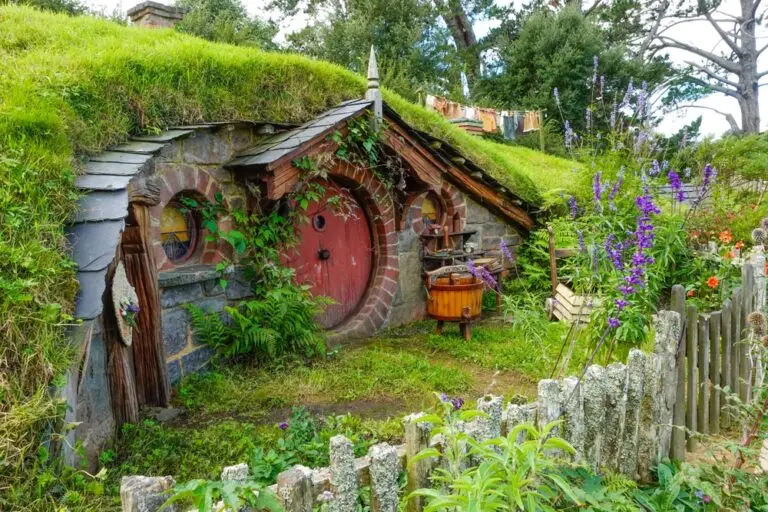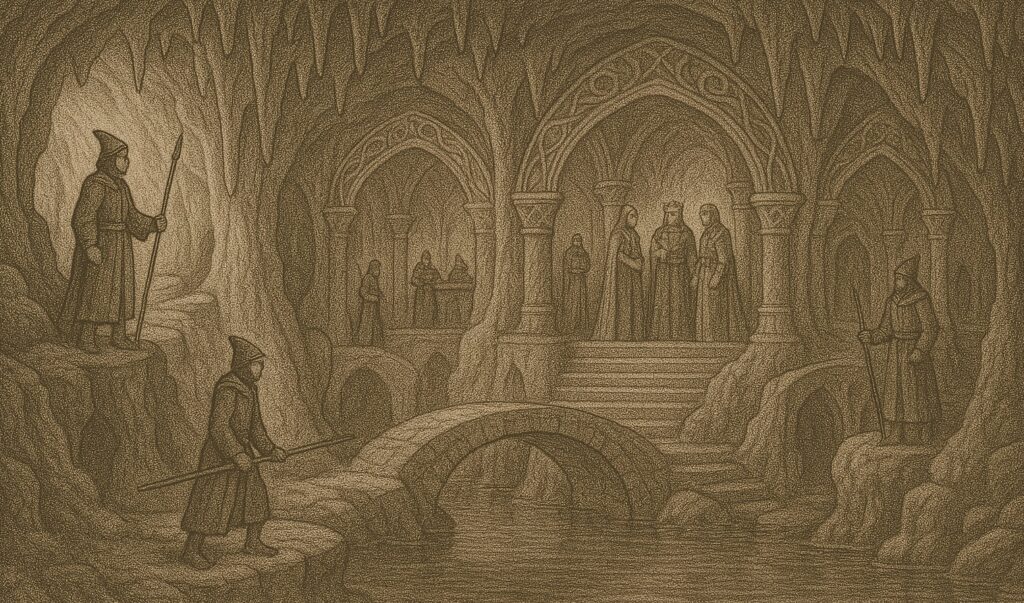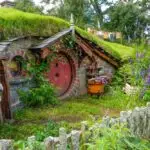
A Socialist reads the Hobbit Part 11 – The Proto-Capitalist Elven Kingdom

I have to say that is not my perception that fairies live in caves. And if wood elves are kind of fairy, I really don’t understand why Tolkien places them underground at all. Nothing I heard about them growing up suggests anything of the subterranean about them. Living a free life amongst the trees and under the stars seems a lot more in keeping with the character I would have given them. But this elvenking has chosen to live underground while at the same time going out for picnics quite often. What is going on? With an invisible Bilbo to investigate, we can do a sociological study of their culture.
The elves turn out to have a highly hierarchical organisation. This is equipped with the apparatus of repression since the dungeons in which the dwarfs are imprisoned already exist and are obviously built for a purpose. We learn that the Elven Kingdom has trade relationships with neighbouring cultures. This is no doubt the origin of the power of the king and his accumulation of capital represents his major motivation. We hear that although he has already acquired a large stock of gold, silver and gems, it was not as large as that of other elf kings. Even at this early stage in technological development where the proto-capitalist stage was as far as they had got, there was intense competition for market share and building large piles of wealth way beyond what was needed for simple subsistence. To be scrupulously fair to the Elven King apart from his treatment of the dwarfs there is not much evidence that he is a particularly oppressive monarch, as monarchs go. We don’t get a lot of his internal politics, but we do learn that elves are ‘good people’. It is quite likely he rules on Enlightenment principles along the lines of someone like Frederick the Great.
The kingdom of the elves is well on the way to developing into a class system. We see this most clearly in the character of Galion, the king’s butler. He has the job of handling the wine. We encounter him getting drunk as a result of drinking wine that was intended only for the King’s table and which was much stronger than that intended for the elven proletariat. Galion is incidentally the only named elf in the Hobbit. I imagine that like most of his stories, he actually has names, family trees and backstories for most of the creatures and beings we encounter. He probably edited them out to make the book more readable at some point, meaning Galion’s unusual status is simply the result of an oversight rather than any hidden significance. But I am getting ahead of myself.
Thorin has had a sleeping spell cast on him enabling the elves to capture him. Bilbo himself nearly suffered a similar fate, but was overlooked. His escape was not noticed by the dwarfs so when they realise he is no longer with them they have no idea where he is. But shortly afterwards they too are captured by a large troop of elves. I am not sure why the kidnap operation takes part in two stages – it doesn’t seem to help the plot in any way. I wonder if it was originally a bit more elaborate but was simplified. But nonetheless that is what happens. The dwarfs are dragged before the king, who demands to know their mission. They won’t say and get locked up in the dungeons. The king claims property rights to the part of the forest they were in, and asserts the right to write the laws in a way that suits his personal and class interests. The dwarfs have the choice of either resisting the coercive power claimed by the state or submitting to its logic and placing themselves at a disadvantage in a system that does not recognise their rights. They choose resistance.
This resistance was likely to be futile, but thanks to his magic ring Bilbo had managed to escape capture and enter the king’s cave. He was thus able to deploy his cunning and intelligence below the surface to thwart the state’s overwhelming power. In the spider incident we see the way Bilbo’s confidence and ability grows in conflict. With the ability to roam freely throughout the elf cave he starts to understand the power relationships and lose some of the bourgeois illusions he had been used to at home. For example he no longer bats and eyelid about stealing the meals he needs to survive. It’s a sort of dialectical process whereby he develops an understanding of the way things work. Later in the book we’ll see him playing a big part on the political stage, and this primer into the way of the world will no doubt help him develop the skills he needs to do so.
He hits on a plan to rescue the dwarfs. This involves subverting the process used to return empty wine casks downstream to Lake Town, a trading partner of the elves. And that is where we are going next.
